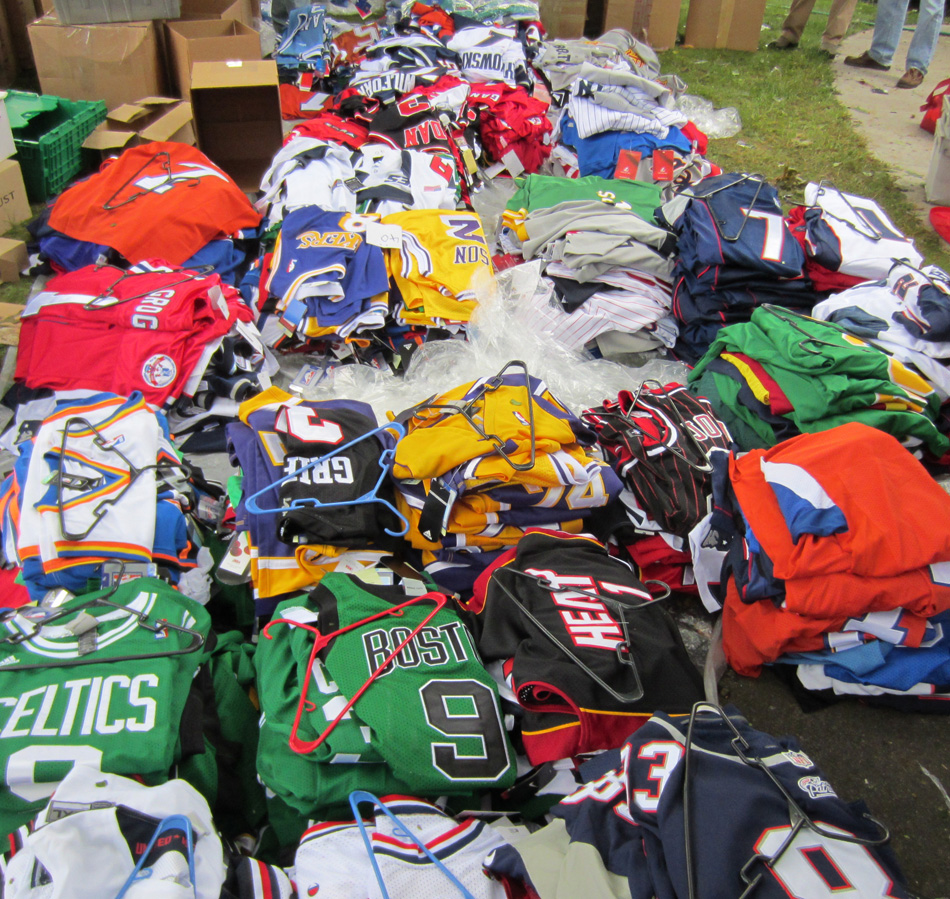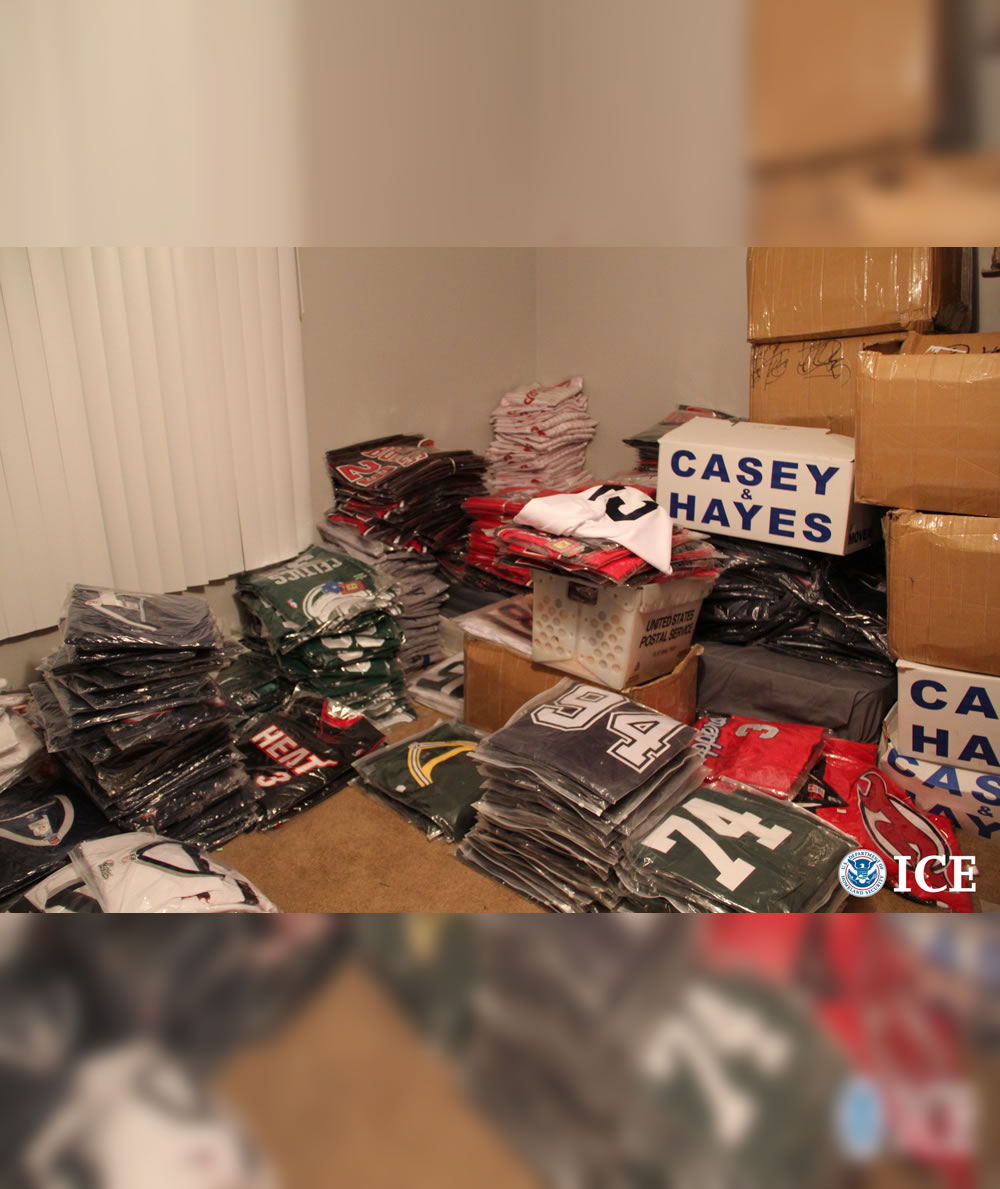Rhode Island resident sentenced to 50 months in federal prison for trafficking counterfeit goods
PROVIDENCE, R.I. — A Warwick man, who previously pleaded guilty to charges related to trafficking in counterfeit sports apparel, was sentenced Thursday to 50 months in prison, followed by three years of supervised release upon completion of his prison term. The sentence resulted from an investigation by U.S. Immigration and Customs Enforcement's (ICE) Homeland Security Investigations (HSI) Providence.
Norman Cipriano, 41, of Warwick, was sentenced for trafficking more than 14,500 counterfeit sports jerseys, clothing accessories and health and beauty products valued at more than $1 million. An amount of restitution to be paid by the defendant to various companies impacted in this matter will be determined at a later date. Cipriano pleaded guilty Aug. 5, 2013, to trafficking in counterfeit goods and services.
"The notion that counterfeit products are a victimless crime is absurd. Criminals who sell counterfeit goods are economic leeches who siphon trade away from legitimate businesses that pay taxes, create jobs and support our local economy," said Eric Caron, resident agent in charge of HSI Providence. "Buying them may appear at first to be a bargain, but when we take into account the common nexus to organized crime or worse, the laborers who may be forced to work in substandard conditions and the locally owned stores forced to close their doors, we see that this 'victimless crime' harms all of us in the long run."
"The world-wide theft of intellectual property and the sale of counterfeit goods is, unfortunately, a burgeoning and increasingly dangerous crime. The distribution of counterfeit medications, both over-the-counter, as in this case, and prescription narcotics, as in other cases we have seen, present an obvious health and safety threat. Trafficking in other counterfeit goods, such as apparel and other consumer products, may seem more innocuous, but nevertheless demands the same aggressive attention from law enforcement. Such criminal misconduct causes irreparable economic harm to the companies that make the real article, including such companies' ability to maintain and create jobs for every-day Americans," said United States Attorney Peter F. Neronha.
According to information presented to the court, HSI special agents in Rhode Island were notified that U.S. Customs and Border Protection (CBP) agents in Anchorage, Alaska, conducted a routine border search of a package arriving from the People's Republic of China addressed to Cipriano at his Warwick residence. The shipment was manifested as "Man Coats." An examination of the contents revealed sports jerseys affixed with NFL Football and Nike trademarked logos. CBP agents suspected that the display of trademarks was unauthorized.
CBP agents shipped the package to HSI special agents in Rhode Island who conducted a controlled delivery of the merchandise to Cipriano's residence Aug. 23, 2012, with the assistance of the HSI Boston Gangs/Commercial Fraud Unit and Warwick Police.
Simultaneously, working in conjunction with HSI special agents from Boston who had already begun an investigation into Cipriano's alleged importation and sale of counterfeit merchandise at a flea market in Raynham, Massachusetts, continued the investigation which included multiple visits and surveillance of Cipriano's activities at the flea market and at his home.
On Sept. 19, 2012, HSI special agents from Rhode Island and Boston, assisted by agents and officers from the United States Postal Inspection Service and the Warwick Police Department, executed a court authorized search of Cipriano's home and two vehicles used to transport the counterfeit goods. The agents seized nearly 5,000 counterfeit sports jerseys, wearing apparel and accessories, and health and beauty aids – including a significant quantity of counterfeit over-the-counter medications. In total, agents seized approximately 14,700 counterfeit items conservatively valued at more than $1.02 million and nearly $56,000 in cash, money orders and a bank check. The following day the government seized a bank account belonging to Cipriano containing more than $76,000.
Queries of CBP data bases disclosed that between September 2009 and June 2012, CBP agents made numerous seizures of counterfeit goods imported into the United States earmarked for shipment to Cipriano's Rhode Island residence. After each seizure, seizure notices were sent notifying Cipriano of the seizure and provided the opportunity to contest the seizure. None were contested.
In October 2012, as a result of his arrest by federal agents for this crime, Cipriano was found to be a probation violator on a 2005 conviction in Rhode Island state court for conspiracy and receiving stolen property. Cipriano served 22 months in state prison on the violation while this matter was pending in federal court.



